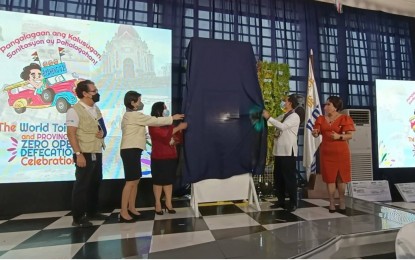
ZERO OPEN DEFECATION. Iloilo Governor Arthur Defensor Jr. and Western Visayas Center for Health Development Assistant Regional Director Dr. Sophia Pulmones (2nd and 3rd from right, respectively) join the unveiling of the Zero Open Defecation seal for the province during the celebration of the World Toilet Day at the Casa Real on Friday (Nov. 18, 2022). The province is the first to be conferred the ZOD seal in Western Visayas. (PNA photo by Perla G. Lena)
ILOILO CITY – In celebration of the World Toilet Day, the province of Iloilo on Friday was conferred with the Zero Open Defecation (ZOD) Grade 1 status, the first Western Visayas province to be awarded with the ZOD seal.
“This month the world reached eight billion people and about 45 percent of the total world populations do not have access to proper sanitation. But Iloilo has a hundred percent coverage and that’s something to be celebrated,” said Carlo Vasquez, chief of the Water, Sanitation and Hygiene (WASH) United Nations Children’s Emergency Fund (UNICEF) Philippines in his message as the ZOD seal was conferred to the province in ceremonies held at the Casa Real, this city.
He said Iloilo province’s journey towards achieving the ZOD G1 status of the Philippine Approach to Sustainable Sanitation (PhATSS) will serve as model for other local governments in the country, as the call continues for other local government units to prioritize investments on the sustainable sanitation program.
He noted that reaching the status requires continuous investment and commitment from leaders like the provincial government and the League of Municipalities of the Philippines.
Vasquez said that its impact can be seen in the reduction of cases of acute watery diarrhea and acute gastroenteritis in the province.
“Over 2 million women, men and children who have abandoned open defecation practices in the province are now experiencing less sanitation-related diseases, most especially to children that translate to less under nourishment and stunting,” he said.
During the conferment, the provincial government also recognized and awarded PHP10,000 cash incentives each to its 43 local government units and PHP5,000 each to 40 barangays who are first adopters of the program.
In his message Iloilo Governor Arthur Defensor Jr. said a lot of work remains ahead as it gears to move up to the G2 of the PhATSS.
“To reach G2 by 2028, we are required to ensure that toilets and hand washing facilities are available anywhere, whether it be in schools, health centers, day care centers or other public places. For this to be realized at the minimum, we would need at least PHP167 million to subsidize the cost of building toilets. And we can only achieve this with the continued support of our local chief executives and development partner,” Defensor said.
The ZOD was first introduced by the UNICEF to the province after Typhoon Yolanda (Haiyan).
Barangay Bariga in the municipality of Banate was the first village out of the province’s 1,721 barangays to be certified as having a ZOD status in 2015.
Meanwhile, the municipality of San Enrique was the last town to achieve the ZOD status upon verification of the compliance of its 28 barangays.
In a press conference that followed, Defensor said sustaining the program entails behavioral adjustment to make sure that toilets are used properly and facilities since even if the province provides toilet bowls, yet it is still not enough.
Dr. Ma. Socorro Quiñon, Iloilo Provincial Health Office chief, said that currently, the basic sanitation program covers 97.7 percent of households, with the remaining 2.3 percent sharing toilets.
“That’s our target, the 10,803 remaining households to have their own sanitary toilets in the next few years,” she said.
Today’s event was also joined by Department of Health Healthy Workplace and Environment Division Chief Dr. Rosalind Vianzon, Western Visayas Center for Health Development Assistant Regional Director Dr. Sophia Pulmones, as well as the mayors and health officers of the 42 municipalities and one component city of the province. (PNA)
